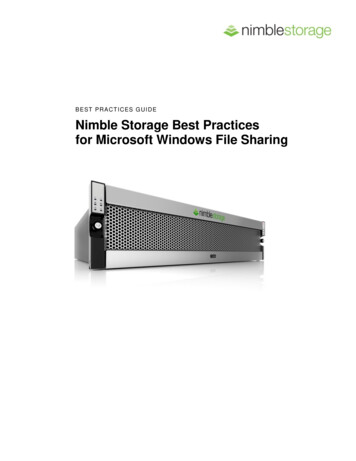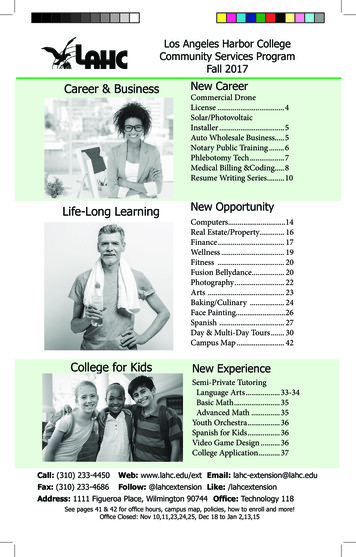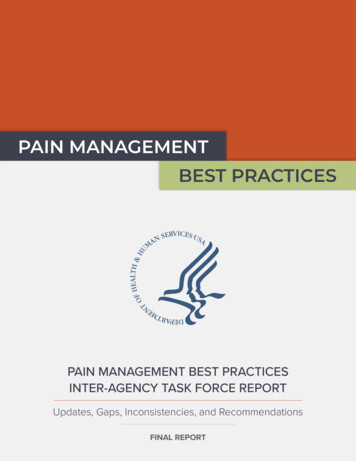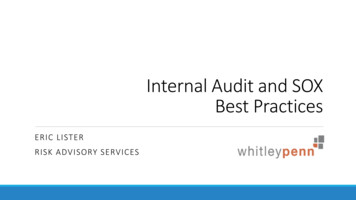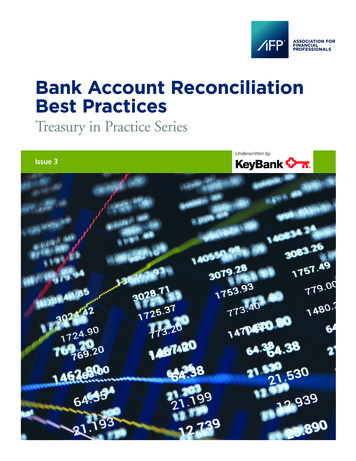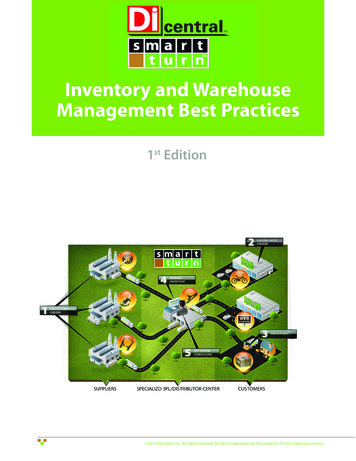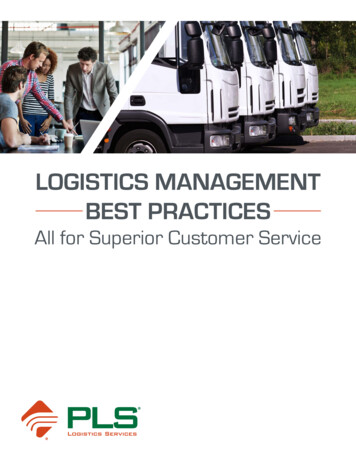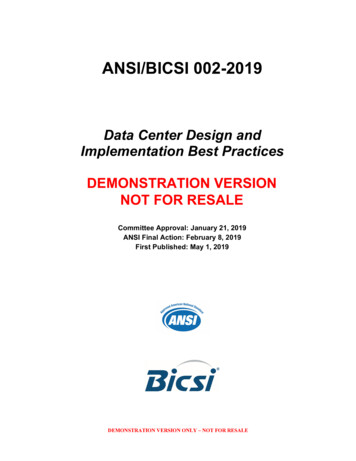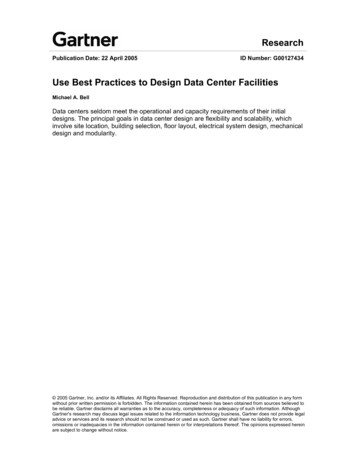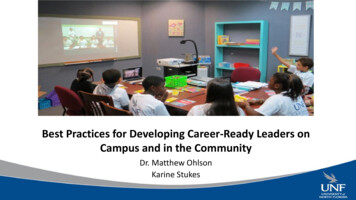
Transcription
Best Practices for Developing Career-Ready Leaders onCampus and in the CommunityDr. Matthew OhlsonKarine Stukes
Presentation Focus1.Why are we here?1. Retention & Career Readiness For CollegeStudents2. College Readiness for K12 Students2.The Data/Impact3.The Recipe for Success4.Stories of Success2
Promising Practices to PostsecondaryEnrollment, Persistence and CompletionPreparatory courses for college entrance examsPreparatory courses for academic and social adjustmentMentoring programsPositive school climateCommunity engagement/community and parentsupport3
Helping College Students Persist, Graduate AND get Hired!LeadershipDevelopmentkey career readiness &“life skills”The Cornerstones ofCollegiate SuccessDiversity andCulturalCollaborationlearning about newcommunities/settingsSense ofBelonging andSignificanceStudents feelvalued in theirmentoring roles
FrameworkCAMP (Collegiate Achievement Mentoring Program) Osprey is aleadership-mentoring program partnering collegiate student leadersfrom across the University of North Florida with students from highpoverty schools throughout the Southeast.To overcome geographic and financial barriers, CAMP Osprey uses"virtual leadership mentoring” to conduct virtual campus tours,interactive learning demonstrations and life-skills training sessions tohelp our leadership “coaches” and K12 “apprentices” become collegeand career ready.5
The significance of providingopportunities for personal growth “I learned SO many leadership techniques that I will have the rest ofmy life. This was a once in a lifetime experience that I am sothankful for being a part of the this mentoring program. It was suchan honor working with the students at Milford ISD and this hastaught me confidence, adaptability, and many other skills. Thisexperience further encouraged me to minor in leadership.” “Getting the opportunity to mentor other young students and alsolearning how to be a leader everyday helped me to become a betterversion of myself.”
Phase 1- Virtual Leadership Mentoring in Action:Covey’s 7 Habits of Highly Effective People Example:– Put First Things First– UNF Alumni &Elementary studentsfrom Crescent City
Phase 2: The College Campus VisitsStudents from urban and rural schoolspartaking in a class in the Department of FineArts & a tennis clinic with NCAA athletes. Overthe past 3 years, 96% of all students visitingthe campus said they now want to attendcollege and 88% said they want to attend UNF.
Campus Visit in HighSchool Leads to Student @ UNF Leadership Practicumleads to StudentGovernment &Career Internship
Phase 2: The Mentors in theCommunityImmerses college students in the surroundingcommunities creating a greater mutual connection andunderstanding for both mentor and mentee. Pictured: UNFWomen’s Tennis Team at Lake Shore Middle in Jax & Mentorstaking students to JC Penny in Palatka for “Dressed for Success.”
The ImpactK12 Schools participating in the virtualleadership mentoring programexperienced gains in studentattendance AND student academicachievementBeyond the numbers “They are learning skillsthat will help them overcome obstacles as theyprogress toward a future of college and careers,”Elementary School Principal
Overcoming Obstacles Cost effective– Reduction in mentor/mentee travel costs Virtual Field Trips and supplemental resources toaugment learning– College and school campus visits Timely and user friendly– Mobile apps– Adaptable to meet the needs of K-12 school schedules
The Impact on our Leadership Mentors
CAMP Achievement Collegiate participants demonstrated the following gains:––––Collegiate mentors have shown increases in their GPA (67% of participants)Increased leadership efficacy (83%)Increased enrollment in the Leadership Minor (15%)Also, each athletic team that collectively participated in the programexperienced significant collective success: Women's Tennis (ASUN Championship) Women’s Soccer (Highest win total in program history)– Program is now heralded as a college retentiontool to combat the 36-38% graduation rate
Best Practices Use an established curriculum:– Manual to Manhood, Girls Guide to Conquering Life– 7 Habits of Highly Effective Teens– C.A.M.P. Program Guide 30-45 minutes per weekly session Hands-on, engaging activities Consistent support from both mentor and menteelocations (staff, teachers, faculty)
School Spotlight: OPJH/ClayCounty
Your Turn as Leadership Coach Turn to a partner and “Coach” each other using the followingprompts (select one):– What are 3 strategies you can offer your partner on how toovercome challenges? What did you do? How did this help you? What would you have donedifferently? Who did you collaborate with to overcome these obstacles?– Name a person who has been an influencer in your life. What arethree traits/characteristics that this person possesses? Which of these traits would you like to emulate? What are some strategies that helped you reach those successes? What’snext for you in terms of goals/future celebrations?– What are 3 successes you’ve had recently?
Next Steps The LEAP - Leadership ExperientialApprenticeship Program– UNF leadership students mentored byalumni & business leaders– Leadership Certifications Covey 7 Habits Dale Carnegie Training
Taj & Jonathan (Best Selling Author)
Diane (Executive Director, RonaldMcDonald House) & Sydnee
Luis & Bob (Retired CEO & Author)
Articles/Publications/PresentationsThe Impact of Mentoring– Journal for Community Engagement & Scholarship http://jces.ua.edu/wp-content/uploads/2018/09/07 JCES11.1 ss.pdf– The Journal of Interactive Learning Research https://eric.ed.gov/?id EJ1166361 ual-mentoring/– EdTech Digest Partnership with (FL) Schools– The AMLE Journal – The Community Foundation for Notheast Florida ing2017.pdf http://jces.ua.edu/wp-content/uploads/2018/09/07 JCES11.1 ss.pdf (University of Alabama)– The Journal of Community Engagement & Scholarship
Contact Information Matthew Ohlson, Ph.D.matthew.ohlson@unf.eduUniversity of North FloridaTwitter: MatthewOhlson1*Tag me on Twitter and receive a freecopy of our Leadership MentoringGuide
– 7 Habits of Highly Effective Teens – C.A.M.P. Program Guide 30-45 minutes per weekly session Hands-on, engaging activities Consistent support from bo
